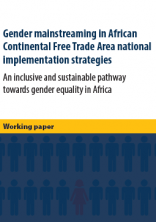Gender mainstreaming in African Continental Free Trade Area national implementation strategies

On 30 May 2019, the Agreement Establishing the African Continental Free Trade Area (AfCFTA Agreement) came into force. The AfCFTA Agreement does not incorporate a separate chapter on trade and gender. The preamble, however, contains explicit reference to the importance of gender equality for the development of international trade and economic cooperation, while article 3 (e) emphasizes the promotion of gender equality as one of the general objectives of AfCFTA. Although there are a number of provisions in the AfCFTA Agreement that can expand the capacity of women to participate in economic and trade opportunities, the benefits of AfCFTA for women are not automatic. Furthermore, consideration will need to be given to the potential differential impact of AfCFTA provisions and the implementation of the Agreement in a manner that opens up new opportunities for women, in particular vulnerable women; enhances their economic participation as a whole; and helps them to integrate more fully into highpaid sectors of the economy. A better understanding of what is required in the context of AfCFTA to enhance women’s economic opportunities, as an intrinsic component of gender equality and women’s empowerment, will help to drive sustainable development, in all its dimensions, towards a more beneficial outcome for all.